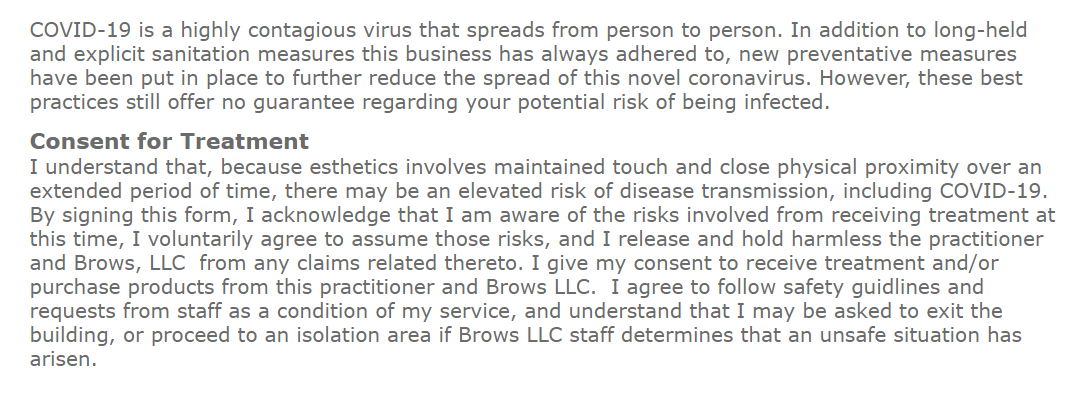The Legal Brief
What is required for a valid waiver in Colorado?
May 22, 2020
By: Wendy G. Adkins
Contractual waiver of liability clauses are recognized under Colorado law, but are construed narrowly and “closely scrutinized” to make sure that the agreement was fairly entered into and that the intention of the parties is expressed in clear and unambiguous language. Raup v. Vail Summit Resorts, Inc., 233 F. Supp. 3d 934, 942 (D. Colo. 2017), aff’d, 734 Fed. Appx. 543 (10th Cir. 2018); citing Jones v. Dressel, 623 P.2d 370, 376 (Colo. 1981). In no event will such an agreement provide a shield against a claim for willful and wanton negligence. Jones 623 P.2d at 376.
In determining whether a waiver of liability clause is valid, the court must consider the following four factors: “(1) the existence [or nonexistence] of a duty to the public; (2) the nature of the service performed; (3) whether the contract was fairly entered into; and (4) whether the intention of the parties is expressed in clear and unambiguous language.” Raup, 233 F. Supp. 3d at 942.
The determination of the sufficiency and validity of an exculpatory agreement is a question of law for the court to determine. Jones, 623 P.2d at 376; citing Ciofalo v. Vic Tanney Gyms, Inc., 177 N.E.2d 925 (N.Y. 1961).
In determining whether there is a public interest, the Jones court looked at Tunkl v. Regents of University of California, 60 Cal. 2d 92, 32 Cal. Rptr. 33, 383 P.2d 441 (1963), in which the California Supreme Court stated:
“In placing particular contracts within or without the category of those affected with a public interest, the courts have revealed a rough outline of that type of transaction in which exculpatory provisions will be held invalid. Thus the attempted but invalid exemption involves a transaction which exhibits some or all of the following characteristics. It concerns a business of a type generally thought suitable for public regulation. The party seeking exculpation is engaged in performing a service of great importance to the public, which is often a matter of practical necessity for some members of the public. The party holds himself out as willing to perform this service for any member of the public who seeks it, or at least for any member coming within certain established standards. As a result of the essential nature of the service, in the economic setting of the transaction, the party invoking exculpation possesses a decisive advantage of bargaining strength against any member of the public who seeks his services. In exercising a superior bargaining power the party confronts the public with a standardized adhesion contract of exculpation, and makes no provision whereby a purchaser may pay additional reasonable fees and obtain protection against negligence. Finally, as a result of the transaction, the person or property of the purchaser is placed under the control of the seller, subject to the risk of carelessness by the seller or his agents.” Id. 32 Cal.Rptr. at 36, 383 P.2d at 444.
Jones, 623 P.2d at 376–77
“[B]usinesses engaged in recreational activities” like Vail have been held not to owe special duties to the public or to perform essential public services. Raup, 233 F. Supp. 3d at 942; citing Mincin v. Vail Holdings, Inc., 308 F.3d 1105, 1110 (10th Cir. 2002).
Operating a gym was likewise found not to meet the public interest test. Ciofalo, 177 N.E.2d at 927. While Ciofalo was decided under New York law, it likely might be followed in Colorado given that the Colorado Supreme Court cited Ciofalo in the Jones decision.
In Colorado, given the case law, it would be wise to specifically reference COVID-19, its contagious nature, and possibly the risk of transmission from person to person. It should include language that the person understands the risk and is voluntarily assuming such risk of exposure to COVID-19 by using someone’s services or premises. A waiver is a strong tool to help avoid liability from someone falling ill from COVID-19.
Since willful and wanton negligence removes the shield of a liability waiver, it is important to take implement safety precautions and procedures for employees and customers. These precautions and procedures should follow guidelines enunciated by state and local officials and the Center for Disease Control and it should be ensured that such precautions and procedures are followed.
Brows, LLC, a shop that provides waxing, makeup and skincare services in Denver and other locations, has the following posted on its website:

Vasa Fitness has an online acknowledgement asking members, among other things, to reaffirm the waiver executed in the membership agreement. That agreement includes an extensive waiver clause and includes language that the member assumes the risk that they may suffer illness by use of the gym. There is no reference to COVID-19 in this clause since Vasa has many members that have signed this form pre-COVID-19. However, the on-line acknowledgment references COVID-19.